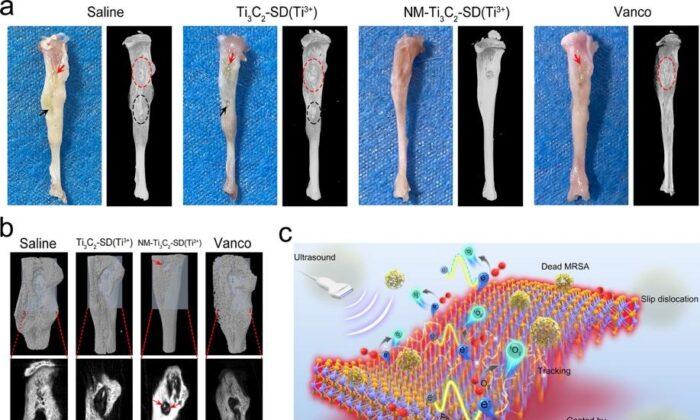Coughing, brain fog, chest tightness, fatigue, and abnormal sense of smell or taste—do these symptoms of long COVID trouble you or your family? While currently, Western medicine lacks widely effective treatments for the ailment, traditional Chinese medicine (TCM) offers some effective remedies.
Clinical Cases for Treating Long COVID
Dr. Shi noted that many long COVID patients experience flu-like symptoms, that in most cases are not flu. He treated a married couple who had been coughing persistently for three months, which, in the view of TCM, is not solely a respiratory issue. Rather, a prolonged cough is typically believed to be related to a patient’s previously poor physical condition. Dr. Shi used different treatment methods based on each of their symptoms, and after about a week, the couple’s persistent coughs were alleviated.Some patients with long COVID symptoms experience loss of taste or smell. For example, for one and a half months, a 37-year-old mother couldn’t smell any odors while changing diapers for her child. Dr. Shi said that this condition could be treated with Chinese medicine to regulate the stability of the patient’s respiratory mucosa. Patients’ taste and smell can be restored within two weeks of treatment.
Dr. Shi found that many long COVID patients feel chest tightness and palpitations but usually don’t have any heart or lung issues. In some cases, problems in the thoracic spine lead to poor cardiopulmonary function, and such cases may not be caused by long COVID.
Many individuals also experience long-term headaches and dizziness, which may be caused by misalignment of the cervical vertebrae. When dealing with these conditions, Dr. Shi first examines the alignment of the patient’s cervical vertebrae, as misalignment can compress blood vessels and muscle nerves. Correcting the alignment of the cervical vertebrae improves blood circulation, relieves the pressure on nerves, and usually provides immediate relief from headaches and dizziness.
Alleviating Long COVID Symptoms: Acupressure, Scalp Scraping, and Tapping
Through acupressure, Dr. Shi states that TCM can alleviate long COVID symptoms such as persistent coughing, brain fog, and muscle weakness.For patients with persistent coughing, two acupoints can be pressed. The first is He Gu (LI 4), located between the thumb and index finger. Its primary function is to boost immunity, which can be pressed five times for a set. Another acupoint is Ridge Spring (CV 23), a depression at Adam’s Apple. It can be gently pressed five times.


Patients experiencing brain fog symptoms, such as mental confusion, forgetfulness, insomnia, or poor sleep quality, often feel tension in their necks, indicating poor blood circulation. Dr. Shi suggests massaging the Fengchi (GB 20) acupoint below the occipital bone. This can be done using hands or a massage stick, effectively relieving brain fog. Additionally, scalp scraping can be performed, which might be uncomfortable initially but leaves a refreshing and energized feeling afterward.

For individuals who may experience migraines, Dr. Shi suggests tapping the acupoints Sun (Ex-HN5) and Valley Lead (GB 8) on the painful side can be helpful. The acupoint Sun is located in the depressions on both sides of the forehead near the lateral ends of the eyebrows. At the same time, the Valley Lead (GB 8) is approximately two finger widths above the apex of the auricle.

Advantages of TCM in Treating Long COVID
TCM treatment usually involves two approaches: The first is to strengthen the body’s abilities by taking herbal supplements that gradually enhance the body’s resistance and allow it to overcome the illness naturally. The second approach is to eliminate pathological factors and reduce the burden on the body, allowing the immune system to restore itself.According to Dr. Shi, the most significant advantage of TCM treatment for long COVID is its ability to stabilize the immune system. The human body has an “immune seesaw,” where an overly strong immune response can lead to allergies such as allergic rhinitis and asthma. In contrast, a weakened immune system makes the body susceptible to viral and bacterial infections. TCM treatment can balance this immune seesaw.
5 Commonly Used Categories of Chinese Herbs for Patients With Different Conditions:
1. Qi-supplementing Herbs
Promote cell regeneration with astragalus root, ginseng root, fleece flower root, and Schisandra. Astragalus root is suitable for people who often sweat and catch a cold quickly from a slight breeze. Ginseng root is ideal for people who easily catch a cold or get infected when fatigued.2. Blood-tonifying Herbs
Herbs such as Szechuan lovage root, angelica root, notoginseng root, and salvia root enhance blood vessel repair. Women prone to infection or catching a cold during, before, or after menstruation can use Szechuan lovage root and angelica root for regulation. For women with blood clots during menstruation, notoginseng root, and salvia root are recommended.3. Yang-tonifying Herbs
To help maintain body temperature and enhance cold resistance use prepared aconite root, cinnamon twigs, and Chinese wild ginger.4. Spleen-tonifying Herbs
These herbs improve the digestive and absorptive functions of the spleen and stomach: poria, bighead atractylodes rhizome, and Chinese yam. They are suitable for individuals with poor digestion, thinness, or difficulty gaining weight, especially children and older adults.5. Wind-expelling Herbs:
Enhance the body’s ability to resist pathogens with cinnamon twigs, ephedra, Saposhniovia divaricate root, shizonepeta, and root of notopterygium. They are suitable for individuals who easily catch a cold after sweating or being out in the wind and can be used for prevention of long COVID.Immune-Boosting Ingredients and Medicinal Diet Recipes
Dr. Shi explains that foods with potent antioxidant properties, including a variety of teas, sweet potatoes, and garlic, typically enhance the immune system.People who feel cold easily can consume sweet potatoes. Those who feel hot or frequently consume oily foods can drink tea. However, it is essential to note that frequent consumption of sweet potatoes may lead to weight gain, and drinking caffeinated tea too late in the day may affect sleep.
Almond and Lily Bulb Porridge
For long COVID patients experiencing persistent coughing, generalized fatigue and weakness, and difficulty digesting food, Dr. Shi recommends a medicinal recipe called “Almond and Lily Bulb Porridge” for nourishment.Combine 10g of almonds, 10g of lily bulbs, 10g of ginkgo nut, 50g of white rice, 20g of rock sugar, and 500 ml of water and cook them together.
The sugar provides the body with quick energy, while almonds and lily bulbs nourish the lungs and alleviate coughing. Ginkgo nuts benefit coughing, gastrointestinal health, and brain function.
For diabetic patients with long COVID, Dr. Shi suggests excluding white rice and rock sugar from the recipe.




